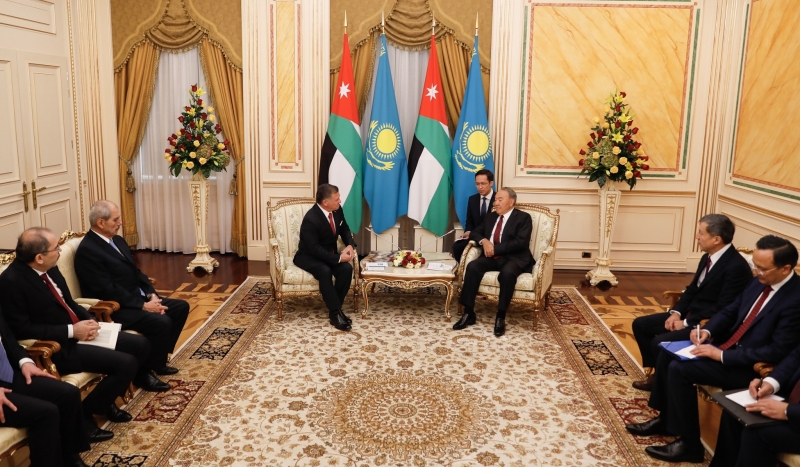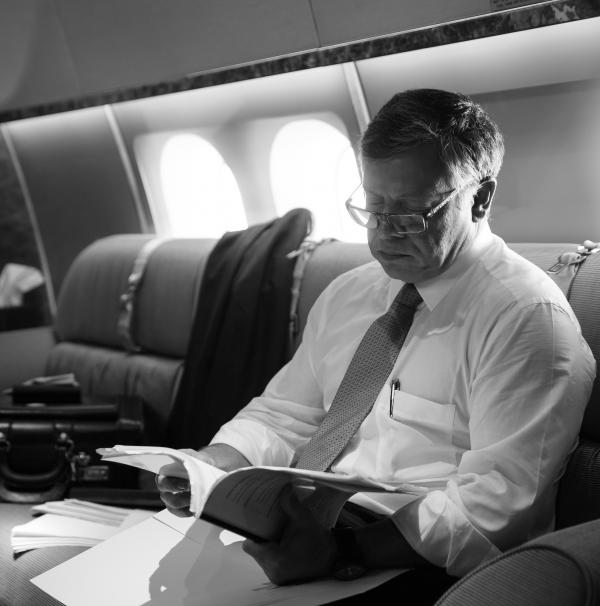King, Kazakh president hold talks in Astana

His Majesty King Abdullah and Kazakh President Nursultan Nazarbayev held talks on Wednesday on means to strengthen cooperation, and on developments in the Middle East.
At the start of the meeting, King Abdullah received the Nazarbayev International Prize for Contributions to Nuclear Disarmament and Security, awarded for the first time, in appreciation of His Majesty’s efforts to bring security and stability to the region and the world.
The prize money will go to support King Abdullah II Schools for Excellence.
In remarks at the meeting, His Majesty said he is pleased to visit Kazakhstan and to be amongst brothers and friends, thanking the Kazakh president for the award and accepting it on behalf of all Jordanians.
Commenting on President Nazarbayev’s remarks that the two countries are marking almost 25 years of relations, the King said the relationship is a generational one, citing the special friendship between the Kazakh president and His Majesty the late King Hussein.
His Majesty also praised Kazakhstan’s role in international affairs, in fields such as nuclear disarmament, interfaith dialogue, and conflict resolution.
If it were not for Kazakhstan’s leadership, the King said the world would be in a much more difficult place.
His Majesty also thanked Kazakhstan for standing by Jordan in difficult times.
Welcoming the King to Kazakhstan, President Nazarbayev said the visit comes in the run-up to the 25th anniversary of the establishment of diplomatic relations between the two countries.
Over the course of these years, he said Jordan and Kazakhstan have had a friendly and fruitful partnership, highlighting the Kingdom’s support for Kazakh initiatives in the international arena and bilateral cooperation in various fields.
President Nazarbayev also commended Jordan’s important role in the region and beyond, and the King’s efforts to resolve conflicts.
Describing His Majesty as an ambassador of peace all over the world, the president said the King has continued the role that the late King Hussein started in promoting the cause of peace.
Kazakhstan is a leader in the anti-nuclear movement and has closed one of the world’s major nuclear test sites, the president noted, adding that he has established a prize for leaders who have a special role in the anti-nuclear movement
The first prize is awarded to the King in the hope that His Majesty will continue to play an important peacekeeping role in the region, President Nazarbayev said.
The talks, which continued over a working lunch held in honour of His Majesty and the accompanying delegation, also covered opportunities to expand economic and military cooperation, and increase trade exchange, especially in agriculture, energy, transport, pharmaceuticals, and ICT.
The two sides also stressed the importance of exchanging visits among public and private sector representatives from both countries to explore investment opportunities.
Discussions addressed the importance of continuing joint work to highlight the true image of Islam and spread the values of tolerance and moderation, in addition to the potential of Kazakhstan benefiting from Jordan’s experience in training imams.
The King and President Nazarbayev also witnessed the signing of five bilateral agreements to boost cooperation and expertise exchange in legal fields.
Foreign Minister Ayman Safadi, Kazakh Foreign Minister Kairat Abdrakhmanov, and Prosecutor General of the Republic of Kazakhstan Zhakyp Assanov signed the agreements.
In a statement to the press, His Majesty said Jordan and Kazakhstan share deep ties of partnership and friendship, expressing keenness to build on them further.
Being the first recipient of the Nazarbayev International Prize for Contributions to Nuclear Disarmament and Security is “an acknowledgement of the efforts of all Jordanians, who are working and sacrificing today for the future of a world that we share”, the King noted.
“To me, this prize stands both for hope, and for responsibility. Hope that humanity can avert the terrible destruction of nuclear war; and that we can achieve the lasting security of global peace and prosperity.
“But also responsibility to act decisively and boldly; and to come together, all of us, to create the conditions for peace,” His Majesty continued, praising President Nazarbayev for bringing “global vision to today’s most pressing international concerns”.
“Today, Kazakhstan is a champion of global coexistence and cooperation. Your country is the first in Central Asia to hold a seat at the UN Security Council,” the King said.
“In nuclear disarmament, Kazakhstan set a standard for all countries when it shut down its legacy nuclear arsenal in 1991—one of the first acts of your independent Republic. Today, this leadership continues in Kazakhstan’s recent establishment of a landmark IAEA fuel bank,” His Majesty added.
“It has been an honour to work with you and your country in multiple areas: for global nuclear disarmament, and security against terrorist threats, for bilateral economic partnership and growth, and for interfaith dialogue, coexistence, and understanding,” the King said.
A shared future of well-being for all people, His Majesty added, requires multi-dimensional efforts.
“No country can say that nuclear weapons, or global terrorism, or regional refugee crises, are another country’s problem. Global economic crises and environmental challenges do not stay contained behind other countries’ borders. All of us are concerned; all of us have an interest in resolving the issues; and all of us have a right and a role in determining the direction our world will take us,” the King noted.
“Nowhere is this more true and more urgent than in the Middle East’s central issue—the Palestinian cause. All are concerned in resolving the Palestinian-Israeli conflict, based on the two-state solution,” His Majesty affirmed.
“Ending this conflict is imperative to regional and global peace, and key to combating extremists by putting a stop to their attempts to employ the failure to resolve it in the service of their dark agendas,” the King said, warning that the absence of inclusive political solutions in the region will only benefit terrorist groups, which remain a threat to global security.
“In this context, a political solution in Syria is vital for regional security and stability. Jordan supports all efforts towards de-escalation in the Syrian conflict that provide a solid ground for successful Geneva talks, including Kazakhstan’s much appreciated efforts in hosting the Astana process,” His Majesty added.
“Jordan and Kazakhstan have enjoyed… more than 25 years of warm friendship, and we are keen to continue to build on these close ties for many years to come. Our meetings here today have been yet another step to advance our cooperation and take our partnership to a new level,” the King noted.
“It is my hope we will go forward together, to expand the horizons of peace and prosperity for our people and for the world. To be with you today, here in your great land—the heart of the continent; a noble link between East and West—is to see a future of infinite goodwill and achievement,” His Majesty said.
For his part, President Nazarbayev said Jordan plays a crucial role in the Middle East, describing it as an oasis of stability and security and praising its efforts on the Palestinian-Israeli peace process and in hosting Syrian refugees.
Wednesday’s discussions, he added, covered relevant international issues, such as the Syrian conflict, the situation in Iraq, and the crisis in Qatar.
The president highlighted Kazakhstan’s efforts in hosting the talks on Syria, which would be the platform for Geneva negotiations, praising Jordan’s role in the Astana process.
Noting that the two countries share good trade and economic relations, he said high transportation costs pose a problem, and expressed commitment to addressing this issue.
Talks also covered the new Kazakhstan-Turkmenistan-Iran highway and the agreement on a new highway that goes through Baku, Turkey, and the Caspian Sea, which, President Nazarbayev said, are new opportunities to improve Jordanian-Kazakh relations.
He also highlighted opportunities for expanding cooperation in agriculture, railroads, alternative energy, and pharmaceuticals, noting that Jordan’s Hikma Pharmaceuticals is building a plant in the city of Almaty.
Other opportunities are available in the scientific, technical, and military spheres, the president said, stressing that fighting terrorism and religious extremism requires cooperation between the two countries’ security services.
Royal Hashemite Court Chief Fayez Tarawneh, Foreign Minister Ayman Safadi, and Adviser to His Majesty and National Policies Council Rapporteur Abdullah Wreikat attended the talks.
An official welcoming ceremony had been held on the King’s arrival at Akorda Presidential Palace, where His Majesty was received by President Nazarbayev and senior Kazakh officials.


